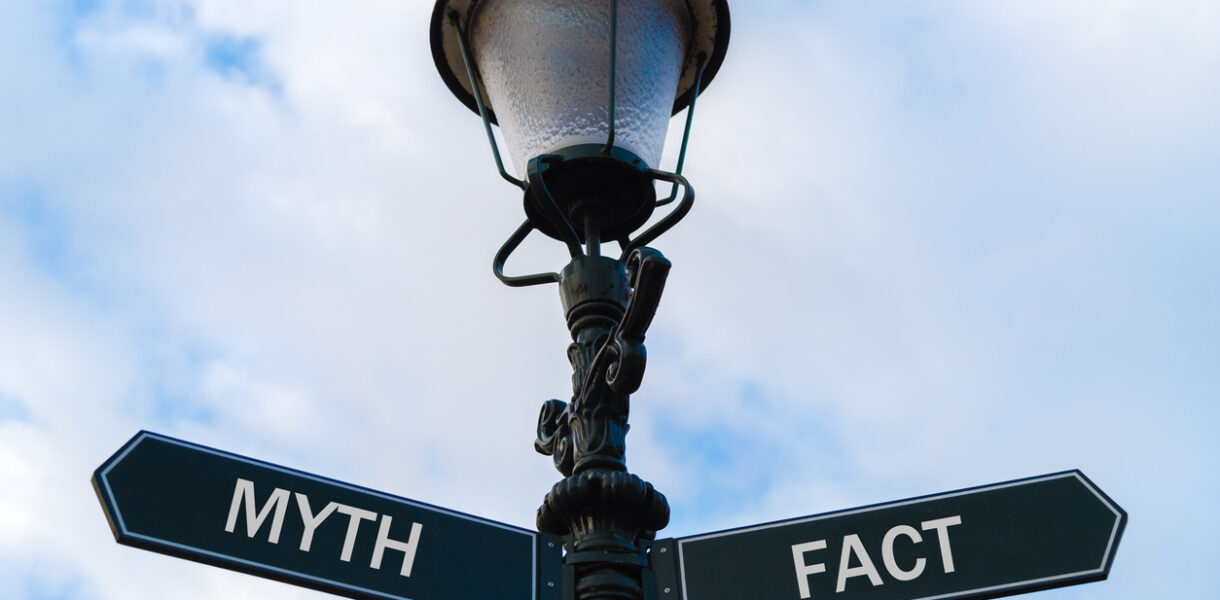
Alzheimer’s Disease and Other Dementias: Myth vs. Fact
It’s important to know the facts about Alzheimer’s because it is a progressive disease — meaning it worsens over time. Knowing the signs, and being able to tell fact from fiction, can provide clues to help you or your loved one get the support you need sooner. Here are some common misconceptions about Alzheimer’s disease and other dementias.
Myth: Memory loss is just a part of aging for everyone.
Fact: While it’s true some short-term memory function declines as we age, Alzheimer’s is more than occasional memory loss. When someone has Alzheimer’s, their brain cells malfunction and eventually die. When this happens, the person may forget the names of friends and family members or even how to get home.
Myth: Alzheimer’s and dementia are pretty much the same thing.
Fact: While Alzheimer’s disease is a form of dementia, not all dementia is Alzheimer’s. Only a doctor may be able to tell the difference. Sometimes similar problems are caused by medication, vitamin deficiencies, other types of dementia or related conditions, and some can be reversed with treatment.
Myth: There are treatments to prevent the progression of Alzheimer’s disease and other dementias.
Fact: There is currently no treatment to cure, delay or stop the progression of these diseases. But there are medications for memory loss, and other treatments that can be helpful in managing cognitive and behavioral symptoms. Researchers continue to look for treatments to improve quality of life for individuals with dementia or Alzheimer’s.
Myth: Only elderly people can get Alzheimer’s and other dementias.
Fact: Younger- or early-onset Alzheimer’s can strike people as young as 30 years old. It is estimated 200,000 of the over 5 million people diagnosed with Alzheimer’s are under 65 years old.
Myth: Alzheimer’s can be caused by aluminum cans or cooking containers, silver fillings, flu shots or aspartame.
Fact: Over the years, the search for a cause of Alzheimer’s disease has focused on all of the above. Sufficient scientific evidence has failed to prove that there’s a link between any of these proposed causes and Alzheimer’s.
If you’re concerned about a loved one’s memory loss and think it’s time to provide them with more care, we are here to help. Call (214) 752-7050 to schedule an Avalon Memory Care tour.
See More Articles
-
Visiting Your Aging Parent With Memory Loss at Avalon Memory Care
As a loving son or daughter, you naturally want the best of care for your senior parent. The compassionate assisted living caregivers at Avalon Memory Care want you to know that while your parent is living with us, he or she will receive nothing less than respectful, loving care within our comfortable, safe, and fully-staffed
-
Celebrating New Year’s Day in Memory Care
Families often find that celebrations with their loved ones in memory care are easier when they embrace new traditions. For instance, it may not be practical to expect your loved one to stay up until midnight on New Year’s Eve. Instead, consider throwing a New Year’s Day celebration, complete with a countdown to the first
-
Understanding Parkinson’s Disease and Dementia
Parkinson’s disease is an incurable neurological disorder, with progressively worsening complications. Perhaps the most well-known symptom of Parkinson’s is a hand tremor, but it can also cause speech changes, muscle rigidity, and impaired posture. Eventually, as the disease progresses, more than half of all individuals with Parkinson’s will require dementia care. This particular type of
Testimonials
Downloadable Resources
We Are Avalon
Discover the heart of our community; download ‘We Are Avalon’ to get to know our dedicated team and our commitment to providing a warm, family-like environment.
Transitional Care Guide
If you’re considering a transition, we’re here to help; download our Transitional Care Guide for compassionate guidance through each step of the process.
Schedule a Tour
Visit one of our 30+ campuses and experience our unique approach to memory care.












